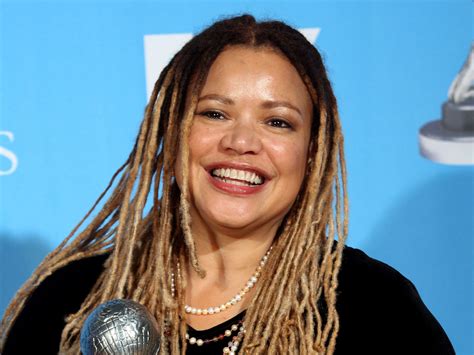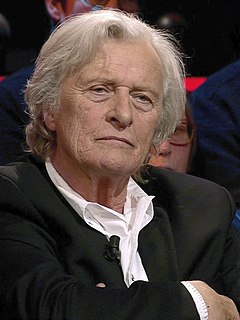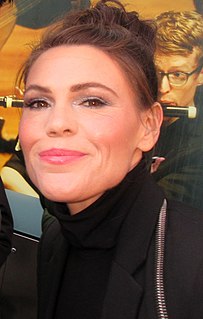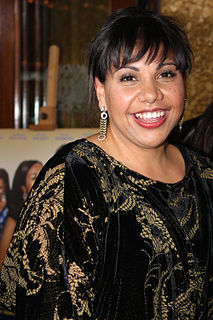A Quote by Kasi Lemmons
The biggest challenges are always getting into the rooms that you need to get into and having people open to the types of stories that I want to tell. And I feel that just being a female director and doing that is a big deal in this country. On my third movie I worked with a French DP. I asked him has he ever worked with a woman director before? He said in France a third of directors are women; so you can’t avoid them. So I realized that the US is behind.
Quote Topics
Always
Asked
Avoid
Before
Behind
Being
Big
Big Deal
Biggest
Biggest Challenge
Challenges
Country
Deal
Director
Directors
Doing
Ever
Feel
Female
France
French
Get
Getting
Having
Him
I Realized
Just
Just Be
Just Being
Movie
Need
Open
People
Realized
Rooms
Said
Stories
Tell
Them
Third
Types
Us
Want
Woman
Women
Worked
Related Quotes
We need more female directors, we also need men to step up and identify with female characters and stories about women. We don't want to create a ghetto where women have to do movies about women. To assume stories about women need to be told by a woman isn't necessarily true, just as stories about men don't need a male director.
In Hong Kong, in our generation that started out in the 1970s, being a director wasn't a big deal. We didn't even have director's chairs. We weren't particularly well paid. The social standing of a film director wasn't that high. It was a sort of a plebeian job, a second or third grade one. And the studio heads are always practical, there's never any fawning because someone is a director. There's very little snobbery about one's position as a director. The only ones people treated differently were those that were also stars; or the directors who also owned their companies.
I think one third of my work is with first-time directors because I think I should, you know? Really, the difference between a first-time director and a second- or third-time director - I mean there's no director who makes enough movies anyway - but if they're talented, they have it. And there is no movie that is perfect.
We need to humanize women instead of making the idea of a woman be so stigmatized. That's what's interesting to me as a writer and a director - being able to tell stories that represent women as human beings and don't relate specifically to their gender. I want to just allow them to have their journeys.
I think the biggest mistake - I was always a big fan of Cary Grant, and he asked me to do a movie with him, playing the second lead, and I didn't do it. And to this day, I can't remember why. But I could've said I worked with Cary Grant, but I turned him down. That was probably the biggest mistake I ever made.
I have worked with a lot of really great women directors: Ana Kokkinos; Cate Shortland, who just recently directed a film called 'Lore;' another director, Rachel Perkins - she's an Aboriginal director, and I've worked with her three times now, and she gave me my first film role, actually, back in 1997.
When I move from being a cameraman to being a director I looked at a lot of other cameramen who tried to make the move. And in each case they moved up their camera operator to be the DP, which really meant they didn't want to give up being the DP, and really wanted to do both. And my feeling was if I was going to succeed as a director, I had to just be a director and give up the safety net of being a cameraman.
Big Fish was the first movie that we worked on together, and I had already written it. We had another director, but that director didn't do it. So, it was just a Hail Mary to Tim, and Tim said that he wanted to do it and I was like, "That's fantastic!" But, there wasn't a lot of collaboration because he knew what he wanted to do and just did it. There were very minor changes for Big Fish.
As an actor, it's always important to understand what the director is after. That, to me, is my job. When I'm acting, I like to ask a lot of questions and understand exactly why the director is doing what they're doing, so that I can provide him or her with the ingredients that they need to get the scene that they want. It's not to challenge them, in any way. It's just so that I can do my job best.
Every film I've ever worked on, and that includes 'Braveheart' and 'Trainspotting,' I've always witnessed a director having a breakdown. Every director will have a day, without exception, where they just can't do it anymore, they don't know what to say to their cameraman, their cast. It's the sign of real, physical exhaustion.
Sometimes people come in as a director, and they just want the result, and they barely want that to tell you the truth. Sometimes directors barely talk to the actors; they are so focused on the cinematic elements of the movie, getting the shot and getting the lighting right or getting the CGI effects right and all of that, and they just trust that you are just going to do what you do.





































